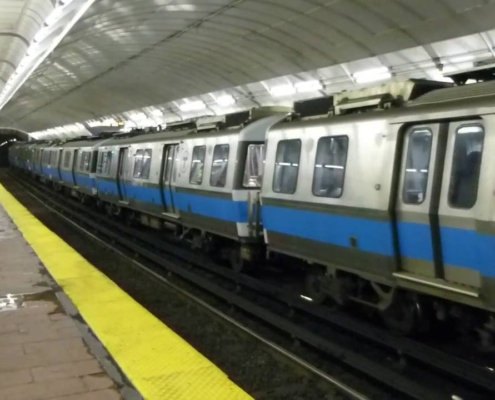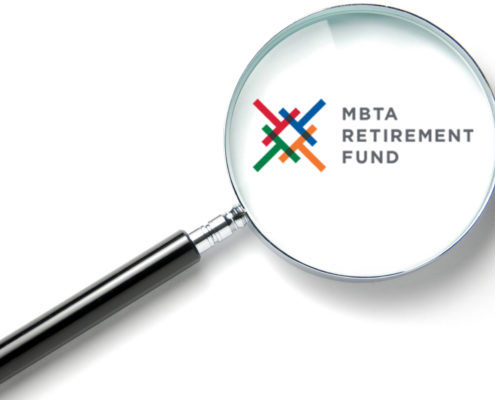Report Calls for Independent Audit & Actuarial Valuation of T Pension Fund
Response commissioned by fund to whistleblower report dismissed or ignored red flags
This report received press coverage in: The Boston Globe, The Boston Business Journal, and numerous radio and television outlets.
BOSTON – The MBTA’s Fiscal and Management Control Board (FMCB) should commission an independent audit and actuarial valuation of the Massachusetts Bay Transportation Authority Retirement Fund (MBTARF) in the wake of red flags that were either ignored or dismissed in a report commissioned by the MBTARF Board of Directors after a 2015 study by Bernie Madoff whistleblower Harry Markopolos and Boston University Professor Mark Williams raised concerns about the fund, according to a new study published by Pioneer Institute.
“FTI Consulting dismissed or ignored a number of legitimate red flags raised by Markopolos and Williams that warrant a de novo investigation of the MBTARF by an independent actuary,” said Pioneer Research Director and former state Inspector General Greg Sullivan, author of “Recommendation to the FMCB: Retain an Independent Auditor and Actuary to Review the MBTARF.”
One of the issues Markopolos and Williams raised involves the weakness of MBTARF board oversight. In its report, FTI stated that nothing that came to their attention suggested that accounting for a $25 million loss on a hedge fund investment pitched to the MBTARF by its former executive director failed to comply with generally accepted accounting principles.
But that conclusion stands in stark contrast to those reached by watchdog agencies that reviewed losses experienced by other pension systems that had been victimized by Fletcher Asset Management during the same time period.
Louisiana’s Legislative Auditor found that three of that state’s systems failed to follow procedures in their dealings with Fletcher. A report about the Fletcher fund by the New York bankruptcy trustee found “numerous red flags that ought to have been readily apparent to the administrators and auditors for the funds.”
FTI failed to address Markopolos and Williams’ criticism that, counter to best practices and despite knowing about the Fletcher loss, MBTARF didn’t disclose write downs associated with it in its 2011 or 2012 Audited Financial Statements. The debacle didn’t become public until it was revealed in a December 2013 Boston Globe report.
The three Louisiana funds victimized by Fletcher issued a statement about two months after learning of their losses.
Sullivan also finds that the MBTARF carefully limited the scope of FTI’s review to preclude the firm from examining whether the fund properly disclosed the loss.
Markopolos and Williams found that MBTARF was the only one of eight major U.S. transit authorities to use outdated mortality tables and that using the tables understated fund liabilities by $105 million.
FTI called using the old tables “reasonable and appropriately applied.” Yet the MBTARF’s actuarial consultant recommended adopting the updated mortality tables in a report that was either completed or nearly finished when FTI issued its findings in March 2016. FTI interviewed the actuarial consultants’ lead actuary during its investigation.
Around the same time, the actuarial consultant recommended that four other public retirement system clients adopt the updated tables. Virtually every other public retirement system in Massachusetts has used them since 2002.
Markopolos and Williams also questioned MBTARF’s “unexplained” decision to reduce its projected unfunded liability by increasing the assumed rate of return (ARR) on its investments from 7.5 percent to 8 percent.
FTI defended the change, noting that it was the result of a capital market analysis of future investment returns based on MBTARF’s asset allocation. But an FMCB report issued just three months after FTI’s report decreased the ARR from 8 percent to 7.75 percent.
FTI was careful to state that its work did not constitute an actuarial audit, noting that it “did not constitute an examination, review or compilation in accordance with standards established by the American Institute of Certified Public Accountants.”
The FTI report also noted that no actuarial audit of MBTARF had been conducted for 11 years. Actuarial best practices approved by the executive board of the Government Finance Officers Association of the United States and Canada recommend that actuarial audits be performed at least every five years.
About the Author
Gregory Sullivan is Pioneer’s Research Director, and oversees PioneerPublic and PioneerOpportunity. Prior to joining Pioneer, Sullivan served two five-year terms as Inspector General of the Commonwealth of Massachusetts and was a 17-year member of the Massachusetts House of Representatives. Greg is a Certified Fraud Investigator, and holds degrees from Harvard College, The Kennedy School of Public Administration, and the Sloan School at MIT.
About Pioneer
Pioneer Institute is an independent, non-partisan, privately funded research organization that seeks to improve the quality of life in Massachusetts through civic discourse and intellectually rigorous, data-driven public policy solutions based on free market principles, individual liberty and responsibility, and the ideal of effective, limited and accountable government.




















